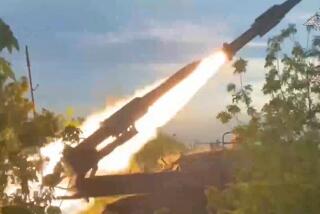Quiet areas of Iraq attacked
- Share via
BAGHDAD — Missiles and mortar rounds Saturday struck areas of Baghdad and central Iraq where violence and civilian deaths had decreased in recent weeks, raising concern that insurgents were adapting their strategy around an increase in the number of U.S. troops.
At least 14 Iraqis were killed: Seven died in a mortar barrage aimed at a Shiite residential area in the town of Khalis, north of Baghdad; in Kirkuk, car bombs killed four people, and a police officer was shot to death; and two were killed in a missile attack on a village near Ramadi.
The attack near Ramadi unleashed panic in an area that had been relatively peaceful, said Juma Salim, 62, a farmer who complained that the presence of U.S. troops provoked the violence.
Kirkuk has suffered a rash of attacks since insurgents began fleeing the U.S.-led security crackdown in Baghdad. Gunmen there killed an Iraqi police lieutenant, and three apparently coordinated car bombs killed four shoppers in a marketplace, including a 4-year-old. Forty-six people were injured. In sweeps spurred by the attacks, U.S.-led troops killed two suspected insurgents and detained 16, said Lt. Col. Christopher Garver, a military spokesman.
U.S. officials say that over the last two months they have captured dozens of key insurgents and disrupted their operations as the troop increase has allowed more concerted moves against hot spots such as Baghdad and the so-called Sunni Triangle to the west and south.
But as violence in those areas has eased, car bombs and small-arms fire have been increasingly directed against Iraqis in more distant areas. Synchronized truck bombings Tuesday in three northern villages killed as many as 400 people of the Yazidi religious sect, the deadliest attack on civilians in the Iraq war. The Bush administration maintains that security is improving.
Iraqi Prime Minister Nouri Maliki says that Sunni tribal leaders have begun collaborating with the government and police to restore order in their communities. “These are all the fruits of the reconciliation process,” the Shiite prime minister said after a visit to Sunni leaders in Tikrit, which was Saddam Hussein’s power base.
In Baghdad, President Jalal Talabani held another gathering of political leaders aimed at reconciling factions in the government. Vice President Tariq Hashimi, a Sunni Arab who had boycotted a meeting earlier in the week, attended the gathering. Talabani’s office said progress had been made.
Omar Abdul-Sattar, a member of parliament from the Sunni bloc’s Iraqi Islamic Party, said that Hashimi aired Sunni concerns about six matters of disagreement within the government but that there was no immediate resolution of any of them. “It is still too early to say the meetings were successful, as there are very hard issues to be discussed and strong differences of opinions, but we can say that the beginning was smooth,” he said. Another session was planned for today.
Even U.S. officials who say progress has been made on the security front acknowledge that Iraqi leaders’ inability to work together effectively has hurt efforts to stabilize the country and hand off responsibility for its defense and administration to Iraqis.
Meanwhile, the international police organization Interpol issued a notice asking foreign police to track down and extradite Raghad Hussein, daughter of the late dictator, who is among 41 members of the former regime that the new Iraqi government accuses of supporting terrorism.
She has been given refuge by neighboring Jordan, which refused to hand her over a year ago when the Shiite-led government asked that she be arrested.
Times staff writer Saif Rasheed contributed to this report.
More to Read
Sign up for Essential California
The most important California stories and recommendations in your inbox every morning.
You may occasionally receive promotional content from the Los Angeles Times.










